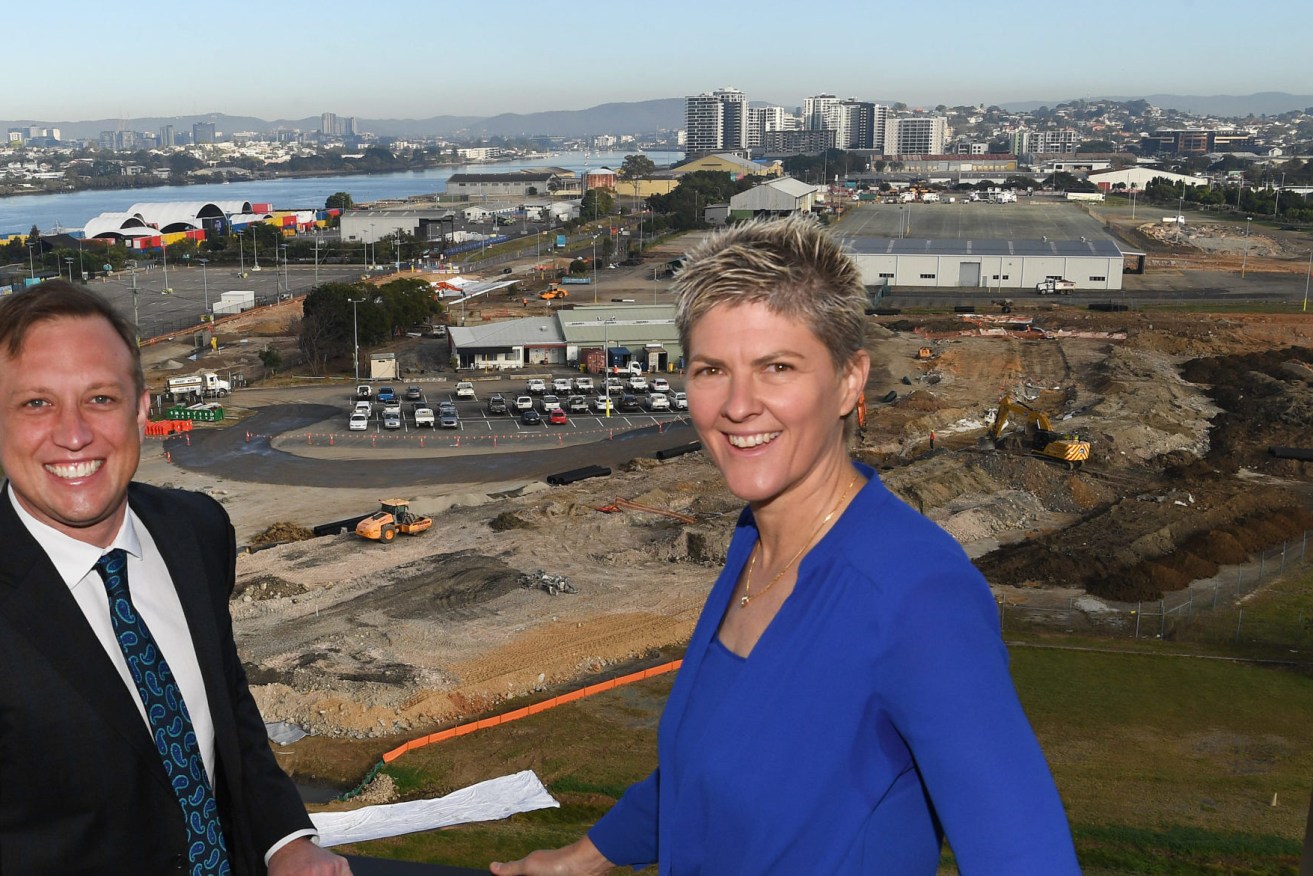Sport and politics: Labor accused of union deals at taxpayers’ expense
As Labor ministers and LNP Lord Mayor Adrian Schrinner clash over early Olympic plans, the State Opposition has sought to highlight cost blowouts in previous projects.

Queensland Deputy Premier Steven Miles (left) and Australian Olympic Gold Medalist Natalie Cook (right) are seen looking over the site of the future Olympic athlete’s village at Northshore Hamilton. (AAP Image/Darren England)
Treasurer Cameron Dick yesterday criticised Schrinner for publicly announcing moves to redevelop a seven hectare site on the river at South Brisbane. Currently occupied by a glass factory, the site has been earmarked for a temporary International Broadcast Centre for the 2032 Olympics before being turned into parkland.
While the State Government has powers of compulsory acquisition, Dick suggested Schrinner sent the “wrong signal that the first thing we are doing for the Olympics is to shut down industrial activity”.
Schrinner returned fire on Twitter last night, saying the government had a habit of denying funding to projects and leaving council to pick up the slack.
“The Treasurer’s petty politicking threatens the solid bi-partisan relationship and intergovernmental cooperation that has served us to well until now on the Brisbane 2032 journey,” Schrinner tweeted from hotel quarantine.
“It needs stop immediately!”
The Commonwealth is the third level of government involved in the Olympics, and Prime Minister Scott Morrison has already warned the State not to make decisions without federal approval. Governments have yet to finalise the all-important organisational structures needed to deliver the games with less politicking.
This morning, on a visit to a Hamilton industrial area that will house the athletes’ village, Deputy Premier Steven Miles said the government would bring forward planned investment to facilitate that redevelopment.
Miles said the Northshore precinct was the size of Southbank – Schrinner had vowed to turn the glass factory at South Brisbane into “Southbank 2.0” – and, over the longer term, would deliver more housing, including affordable housing, aged care, and disability services.
“It’s certainly essential to what this government believes in and wants to deliver on,” Miles said.
Asked about the Olympic-sized threat to industrial land and jobs in South Brisbane, Miles noted the area was already undergoing gentrification and he was confident the broadcast centre could be delivered.
“That’s an incredibly important component of the Olympic games but we’ve got a long time to work on it,” Miles said.
He suggested it should not be surprising to hear the Treasurer wanting to carefully manage government funds for any acquisitions.
In a subsequent budget estimates committee hearing, Opposition frontbencher Fiona Simpson questioned Miles over the impact of the government’s best practice principles on other projects.
Simpson suggested the $40 million blowout in the cost of the Townsville stadium, which minister Mick de Brenni in 2019 said was to accommodate the principles, was in fact a deal with unions. There had been industrial tensions at the site.
But Miles said the principles encouraged the use of local workers, local contractors and local products to extend the economic benefit of projects, and the LNP should not advocate for the alternative.
“It’s to the heart of what we budget for,” he said.
As is customary in such hearings, the proceedings then became mired in objections and interjections, with Simpson asking the committee chair, Labor’s Chris Whiting, why he had not spoken up to declare his CFMEU membership given the topic under discussion.
Whiting urged Simpson to “be very careful where you are going with this” and insisted he did not have a conflict of interest. He then called a brief recess for MPs to discuss the matter, prompting Simpson to claim “this is a gag motion, this is all about protecting yourself,” before proceedings resumed.
Opposition leader David Crisafulli set the scene for such a dispute before the hearing, when he accused Labor MPs of running a “protection racket” that had hindered the LNP’s ability to uncover more financial wrong-doing.










